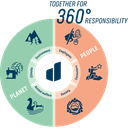On 7 December 22, more than 150 textile sector stakeholders from across the globe joined the GIZ FABRIC Hybrid Regional Conference on Textiles Sustainability where good practices for sustainable business and fair production were presented and the Asia Garment Hub was accentuated with a strong focus on regional exchange and dialogue.
"Hanging by a thread - the textile industry in Asia during the COVID-19 pandemic" is a digital exhibition designed to summarise results and showcase activities from different projects of the German Development Cooperation that were implemented in the textile industry in Asia during the pandemic.
German outdoor brand deuter has developed a Promise Policy. We talk to Marco Hühn, Head of Quality Management, CSR, Repair Service at deuter Sport GmbH, about the importance of understanding suppliers' needs, and how the Promise Policy can help prepare for corporate Due Diligence obligations in supply chains at national and EU level.
Have you ever heard of the Dindigul Agreement? In our explainer you will learn everything you need to know.
Starting June 1, Remake is launching the #NoNewClothes Challenge. The challenge calls on consumers to not buy new clothes for 90 days. We speak with Katrina Caspelich, CMO of Remake, about how this Challenge addresses the larger systemic issues in the fashion industry, how it can help improve the lives of garment workers who depend on the production and sale of new clothes, and the role brands and retailers play in driving change toward fair wages and safe working conditions for garment workers.
For the first time, the Bangladesh Circular Economy Summit is taking place in Dhaka.
In the EU, 12.6 million tons of textile waste are generated per year. The European Commission is now responding with a new legislative initiative that holds manufacturers accountable.
The "Common Framework for Responsible Purchasing Practices" now provides an aligned reference document for the garment industry. Several multi-stakeholder initiatives have developed the document and hope that the framework will help to focus attention on the changes needed, as a contribution to improved impact.
Today, Quizrr, an EdTech provider of human and labour rights training, announced the launch of a worldwide program that will educate workers in global supply chains on labour rights.
Join us for a discussion on how we step up the fight against forced labor through collaboration, innovation, and data. During this live discussion between human rights pioneers, Matt Friedman, CEO and Founder of Mekong Club and Sofie Nordstrom, Co-founder of Quizrr, will discuss these burning issues in a constructive actionable way, looking at how companies and organizations in global supply chains work proactively to address the forced labor issue - in pre-competitive collaborations, with an innovative tech-based approach and with using instant data.
Better Work Bangladesh has renewed its strategic focus on gender equality and women’s economic empowerment by integrating principles of gender equality and inclusion in all aspects of its work. This strategy looks at the current context of gender equality in Bangladesh and outlines Better Work Bangladesh’s approach, while laying out a future framework for promoting gender equality in the Bangladeshi garment sector.
More information coming soon.
The OECD e-learning Academy on Responsible Business Conduct (RBC) provides learners with a unique opportunity to advance their knowledge on responsible business conduct and OECD risk-based due diligence. Through the Essentials of OECD Due Diligence for RBC course launched in August 2021, you will learn about: International expectations on RBC and why business should care; Characteristics of the OECD due diligence approach including how it can be tailored to a company’s circumstances; and Key elements of OECD risk-based due diligence including recommendations to prioritise risks and engage with stakeholders for effective due diligence. Learners are strongly encouraged to complete the Essentials of OECD Due Diligence for RBC course to optimise the learning experience with the forthcoming OECD Due Diligence for Garment and Footwear Supply Chains course (available later in 2021) that explore how due diligence works in the sector. The OECD e-learning Academy on RBC is open to all stakeholders interested in learning about RBC and risk-based due diligence, at no cost.
A two-page flyer introducing the OECD's Due Diligence Guidance for Responsible Supply Chains in the Garment and Footwear Sector
Moving the needle: Creating the future together | Online Seminar 5 | Please find the recording under: "Web" (on the right-hand side)
Moving the needle: Creating the future together | Online Seminar 1 | Mandatory due diligence in supply chains shows once more how interconnected supply chains are. These requirements coming from Europe and America though the intermediaries of the brands impact the current business practices in Asia in the Asian Garment and Textile Sector. This is the first of two online seminars dealing with mandatory due diligence in supply chains. The first one provides a high-level overview of some of the legal approaches already in place: this includes France (in place) Germany and California (to be enacted soon), and EU (coming soon). The purpose of surveying this new legal landscape is to alert all stakeholders to the dawn of what appears to be a new era of mandatory due diligence around social and environmental issues. The event took place on 17th November 2021.
Moving the needle: Creating the future together | Online Seminar 2 | Germany’s Federal Cabinet approved the Act on Corporate Due Diligence Obligations in Supply Chains in mid-2021, which aims to prevent human rights violations. Stage One will come into force in January 2023, with a broader scope scheduled for January 2024. This online seminar explores the Act and how it will impact Asian producers. It will also introduce a new GIZ project called Initiative Global Solidarity, which aims to empower buyers and suppliers to cooperate and improve effective due diligence systems in their supply chains through shared responsibility approaches. The event took place on 23rd November 2021. This is the second online seminar (recorded webinar) in a series on the new legal landscape and aims to alert all stakeholders to the dawn of a new era of mandatory due diligence around social and environmental issues.
Moving the needle: Creating the future together | Online Seminar 3 | Gender based violence and harassment (GVBH) is a widely discussed topic in the garment and textile sector. Many actors are determined to fight for safer factories and a healthy environment for workers. Raising awareness and sharing tools and approaches is one of many ways in which stakeholders come together in their efforts. Today we want to look at the specific roles of industry stakeholders and how each of them is creating an enabling environment in preventing and remediating GBVH, with reference to new tools developed to support a healthy sector. The objective of the event is to show that tackling gender-based violence and harassment is a collective responsibility across the supply chain – one that demands collaboration from manufacturers, brands, workers, and policymakers alike. The event took place on 9th November 2021.
Moving the needle: Creating the future together | Online Seminar 4 | This seminar focuses on recycling post-industrial (pre-consumer) textile waste in two production countries (Bangladesh and Cambodia).
Moving the needle: Creating the future together | Online Seminar 8 | This online session brings together individuals advocating for stronger language on purchasing practices within due diligence legislation to discuss: what does legislation as it stands require and why? Is it enough? And if not, what can still be done?
Hybrid Conference
Moving the needle: Creating the future together | Online Seminar 9 | Please find the recording under ''Web'' (on the right-hand side)
Technical Seminars: A deeper Dive | Online Seminar 4 | Please register under: "Web" (on the right-hand side)
GMAC and GIZ FABRIC warmly invite you to attend our first post lockdown, physical Asian Dialogues conference.
Technical Seminar 4: The Circular Economy
Hybrid Conference ‘’Asian Dialogues for Greener Production’’: Opening Remarks, Key Note and Opening Panel
Hybrid Conference ‘’Asian Dialogues for Greener Production’’ | Workshop
Hybrid Conference ‘’Asian Dialogues for Greener Production’’ | Workshop
Hybrid Conference ‘’Asian Dialogues for Greener Production’’ | Workshop



























